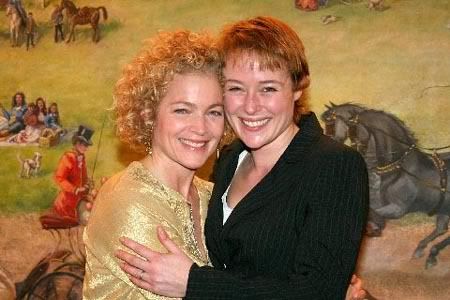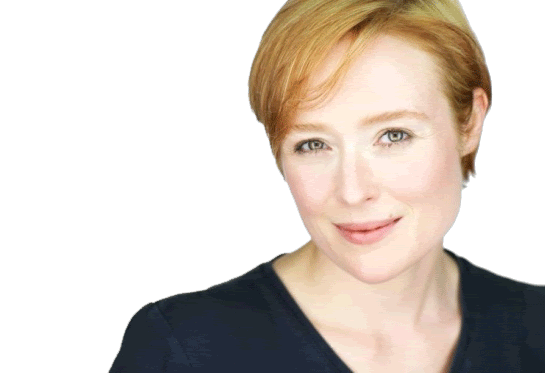

First up: photos! BroadwayWorld has opening night ones and AM New York's slideshow has a few stage stills. Hold on, more opening night photos at Theatermania...and a trillion more if you search for "Coast of Utopia" or "Ehle" at BrunoPress, FilmMagic, Getty Images, WireImage, Isifa. And still more in the Broadway.com photo gallery (photo 11 is with Oskar Eustis, 33 is with Martha Plimpton).
Now, reviews. Click through to read the whole reviews; quoted here are the bits that mention her perf. Spoilers galore.
O'Brien expertly guides the large cast. Hawke delivers a high-octane and edgy performance as the egotistical Bakunin; Easton adds dignity as his loving father. Crudup steals the show as the impassioned and impoverished Belinsky. Jennifer Ehle, as Michael's lovesick sister, provides much-needed emotion for the proceedings, while Martha Plimpton makes a vivid impression as his most adventurous sibling.
There will be more time later in the story to consider the actors swirling through the trilogy (O'Brien makes telling use, by the way, of the often derided Beaumont stage), but even at this first stopping point, enormous praise is due to Crudup's mousy-looking but valiant sketch of the great Russian critic Belinsky; O'Byrne's centered revolutionary, Herzen; and the shining-faced Ehle as the doomed, Chekovian-like Bakunin sister, Liubov.
Harbour carves a soulful, amusing character out of excitable Stankevich, while in smaller roles, O'Byrne, Hamilton and Harner all suggest further developments to come. Jennifer Ehle and Martha Plimpton make vivid impressions as two of Michael's adoring sisters. The romantic idealism of the Bakunin girls, inspired by George Sand, is poignantly echoed in the sad outcomes of their relationships.
As for the central performances, there isn’t space here to describe them in the detail they warrant. If some lack the subtlety of their London predecessors, none are wanting in present-tense vividness. (Mr. Easton, Amy Irving, Jennifer Ehle and Martha Plimpton, as members of the same fraught family, are especially affecting. And I enjoyed David Cromwell’s take on an aging, worldly man of letters.)
Vivid flashes of humanity are rendered by a 44-member company under O'Brien's masterful direction. An anarchist in the making, Michael is excitingly portrayed by Hawke as the 1800s equivalent of a rock star. Among his confederates, Billy Crudup's bumbling journalist, David Harbour's doomed philosopher and Brían F. O'Byrne's steely idealist are standouts.
On Michael's home front, Richard Easton's lordly paterfamilias and Jennifer Ehle's consumptive sister are especially touching.
The acting is mostly admirable from a populous cast of both major and minor players. To list only my personal favorites (yours, with equal justice, may be different), I adduce David Harbour's naively generous, sweetly impractical Stankevich and Billy Crudup's passionately admonishing, sublimely unworldly Belinsky. Also Martha Plimpton's at first carping but eventually pragmatic Varenka and Jennifer Ehle's fragile but not spineless Liubov.
The cast includes several Stoppard veterans, each of whom seizes on delicious new angles to past successes. Ms. Ehle, all poise and certainty in 2000's Broadway revival of "The Real Thing," dazzles as the far less assured Liubov. (She won a Tony in 2000 and is even better here.) Mr. Easton's Alexander Bakunin is as emphatic as his A.E. Housman was tentative in "The Invention of Love." And Mr. Crudup, who launched his career as the Byronic tutor Septimus in "Arcadia," is almost unrecognizable as the adenoidal, fidgety Belinsky, who describes his impetuous writings as "chaos, excess, and no mercy."
Brían F. O'Byrne - first seen as an old man - establishes the ultimate moral center of Alexander Herzen, who sees the contradictions between surface civility and oppression. And the actresses - especially luminous Jennifer Ehle and Martha Plimpton - struggle nobly against our unavoidable sense that these ecstatic young characters have wandered in from a Eurocentric Russian production of "Little Women."
Stoppard tends to use domestic scenes like these to lighten up the heavy thinking in his plays: Consider Jumpers, which leavens its three hours of philosophical debate with marital spats and stripping. In Voyage, the pattern’s reversed. Stoppard delves into the romantic troubles of the Bakunin girls, who seek, reject, and are rejected by an array of suitors. But it’s never clear why we ought to care about their heartache, despite the best efforts of Jennifer Ehle and Martha Plimpton to persuade us. Some wonderfully scandalous love affairs are due to arrive later in the trilogy, so Stoppard may yet recover the light touch for relationships he’s shown lately. For the time being, it’s a relief to leave the Bakunins’ personal lives for the simpler ground of Kantian metaphysics.
It is relatively minor characters, Bakunin's sisters -- stimulated by the novels of George Sand into yearning for romantic love -- whose relationships we hear about. (Most of the action takes place offstage.)
The only courtship we see is that of Bakunin's oldest sister, Liubov, played with great charm and sweetness by Jennifer Ehle, and the shy young philosopher Stankevich, portrayed with comparable appeal by David Harbour.
Toward the end, this vital cast conjures cresting and contrasting emotions with such insight and visual brilliance they confirm O'Brien as Stoppard's foremost interpreter. From the depths of the Beaumont stage, four crouching serfs haul thick ropes to roll a pianoforte forward. Lit by candlelight, Liubov Bakunin (Jennifer Ehle) and Nicholas Stankevich (David Harbour) are seated there, playing a Chopinesque duet as they talk.
Their dewy, tentative sympathy makes their fates all the more poignant; each, so full of promise, will soon die of consumption. Harbour's Nicholas, smitten by German idealism, seems a likable dreamer, pure of heart, if short on experience. The glowing Ehle – as emotionally focused and quietly commanding an actor as her real-life mother, the legendary Rosemary Harris – creates a tremulous, though common-sensical Liubov.
Other bits on the blogs and elsewhere:
Voyage had an opening last night, and the reviews today are wonderful, but just because the play is about Fichte, Hegel, and Kant doesn't mean you don't want to know about Chanel, Dior, and Ralph Lauren -- what everyone was wearing. I wish I could be more help in this department, but by the time the cast repaired to the Upper West Side bar Fred's for the after party I realized that my camera phone had broken down. Here's all I remember on the fashion front: actor Robert Stanton was wearing Nicole Farhi and every woman was sporting something to show off her figure.
Among a group of theater people the Farhi connection is understandable: she's married to playwright David Hare. The women's clinging fabrics also make sense: if you had to wear form-concealing crinolines every night on stage you'd want to bust out, too. Call me a sexist if you like, but even before I downed a drink I was quite content to observe Kellie Overbey in her shiny '60s number (and new bangs); Jennifer Ehle appearing like she'd just come off a Hollywood red carpet; Patricia Conolly looking beautifully made up; and Erika Rolfsrud inhabiting precincts of glamour usually reserved for Vogue cover girls. Martha Plimpton may have been the most ready-for-her-closeup: she not only knows how to wear a spangly black cocktail dress with utter nonchalance but, when the clamor for booze at Fred's, her usual civilian hangout, overwhelmed the bartender, she displayed another skill: she broke the pub's fourth wall and assisted him. [...]




4 comments:
Congratulations on the outstanding reviews, as well as for being singled out for your performance!
Break a leg!
Don't forget the opening night video on Broadway.com!
Thanks Kate, didn't see that!
Just so it's clear for everyone- no communication with JE is possible through the blog. We're just fans here :)
I saw shipwreck tonight and I have to admit you look better naked than anyone I've ever seen in a show. Most people are uncomfortable the whole time they are naked, but it was no big deal for you.
Sadly I was on the left side so I never saw your front, but you have beautiful skin and a nice butt.
When nudity is warranted it can be a great thing, when it is just put in for hype it is horrible. This is a case when it added to the play.
Post a Comment